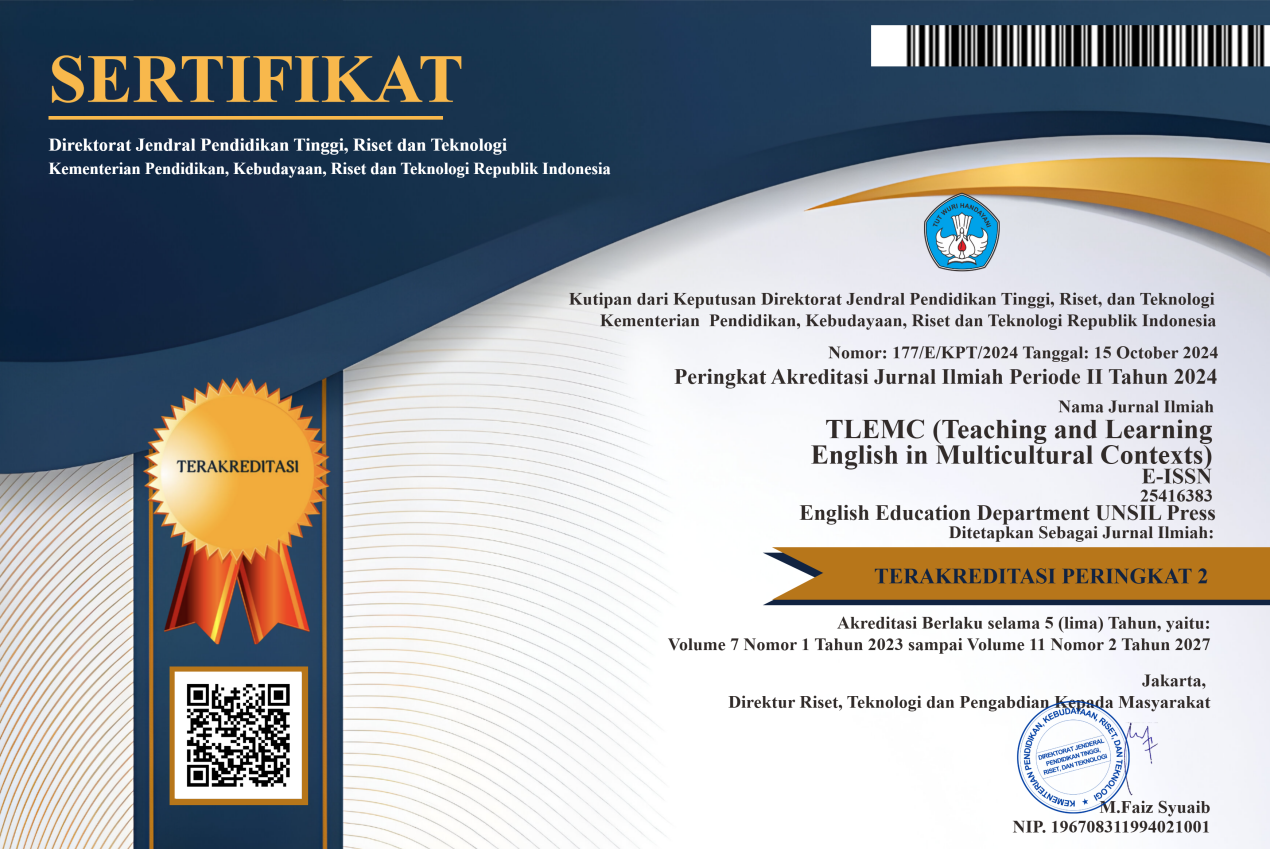STUDENTS' PERCEPTION ON THE USE OF ROLE PLAY BY TUTOR IN CLASSROOM
Abstract
The use of learning methods that are in accordance with the conditions of students is a must for teachers in order to maximize the results of the learning process. One method that can be used is role play. This study aims to determine student perceptions of learning activities followed by students who use the role play method by the teacher during the learning process in the classroom. Data is collected by using interviews with students who have carried out role play activities. Data were analyzed using thematic analysis techniques (Braun & Clarke, 2006). The results show that use of role play can: (1) increase students' confidence to communicate with others, (2) increase students' ability to build language competence, (3) increase students' motivation, (4) help students eager to learn (5) motivate students to be active in learning process. Thus, students' perceptions of learning using role play show positive student perceptions.
Full Text:
PDFReferences
Alabsi. 2016. The Effectiveness of Role Play Strategy in Teaching Vocabulary. Theory and Practice in Language Studies, 6(2) 227-234,
Altun, M. (2015). Using role-play activities to develop speaking skills: A case study in the language classroom. International Journal of Social Sciences and Educational Studies, 1(4), 27-33.
Arham R, Abdul Hakim Yassi, & Burhanudin Arafah. (2016). The Use of Role Play to Improve Teaching Speaking. International Journal of Scientific and Research Publications, Volume 6, (3), 239-241.
Braun, V. & Clarke, V. (2006) Using thematic analysis in psychology. Qualitative Research in Psychology, 3, 77-101.
Brown, H. D. (2008). Prinsip pembelajaran dan pengajaran bahasa. Jakarta: Kedutaan Besar Amerika Serikat.
Byrne, D. (1986): Teaching oral English. London: Longman.
Cameron, L. (2001). Teaching languages to young learners. Ernst Klett Sprachen.
Chauhan, P. M. (2015). Role play: A means of dialogue for learning English language. Arts Social Sci J, 6(132), 2.
Cornett, C. E. (1999). Whole Language, Whole Learning. Phil Delte Kappa Educational Foundation.
Critcher, C. R., & Gilovich, T. (2010). Inferring attitudes from mind wandering. Personality and Social Psychology Bulletin, 36(9), 1255-1266.
Fadilah, F. (2016). Teaching speaking by role-play activity. OKARA: Jurnal Bahasa dan Sastra, 10(2), 209-216.
Fontana, A., & Frey, H.J (2005). The Interview: From Neutral Stance to Political Involvement. In N. K. Denzin & Y. S Lincon (Eds). The Sage Handbook of Qualitative Research (pp. 695-727). Thousand Oaks, CA: Sage Publication Ltd.
Forgus, R. H., & Melamed, L. E. (1976). Perception: A cognitive-stage approach. McGraw-Hill Companies.
Gass, S., Mackey, A (2006). Input, Interaction and Output: an Overview.AILA Review, 19, 3-17.
Huang, L (2008). Role Play for ESL/EFL Children in the English Classroom. In Rojas, A. M., Villafuerte, J (Eds). The Influence of Implementing Role-Play as an Educational Technique on EFL Speaking Development. Vol.8, No.7, pp. 726-732.
Huang, X., & Hu, X. (2016). Teachers' and Students' Perceptions of Classroom Activities Commonly Used in English Speaking Classes. Higher Education Studies, 6(1), 87-100.
İnceçay, G., & İnceçay, V. (2009). Turkish university students’ perceptions of communicative and non-communicative activities in EFL classroom. Procedia-social and behavioral sciences, 1(1), 618-622.
Krebt, D. M. (2017). The Effectiveness of Role Play Techniques in Teaching Speaking for EFL College Students. ISSN 1798-4769. Journal of Language Teaching and Research, Vol. 8, No. 5, pp. 863-870.
Krisdiana, B. P., Irawati, E., & Kadarisman, A. E. (2018). The Effectiveness of Role-Play Integrated with Word Cards on Students’ Speaking Skill for Communication. Jurnal Pendidikan Humaniora, 6(2), 78-84.
Ladousse, G.P (2004). Role Play.Oxford University Press. UK. In Alabsi, T. A. (2016). The effectiveness of role play strategy in teaching vocabulary. Theory and practice in language studies, 6(2), 227-234.
Liu, F., & Ding, Y. (2009). Role-play in English language teaching. Asian Social Science, 5(10), 140-143.
Neuendorf, P., & O'Connell, M. (2011, March). To be or not to be–That it the role play question. In Society for Information Technology & Teacher Education International Conference (pp. 2182-2191). Association for the Advancement of Computing in Education (AACE).
Neupane, B. (2019). Effectiveness of Role Play in Improving Speaking Skill. Journal of NELTA Gandaki, 1, 11-18.
Nga, N. T. T. (2011). The Use of role-play activities in improving speaking skills of first-year chemistry-majors at Ha Noi University of Industry. Retrieved from http://dl.vnu.edu.vn/bitstream/11126/446/1/04051000589.
Nunan, D. (2001). Second Language Acquisition. In R. Carter, & D. Nunan (Eds.), The Cambridge Guide to Teaching English to Speakers of Other Languages (pp. 87-92). Cambridge: Cambridge University Press.
http://dx.doi.org/10.1017/cbo9780511667206.013
Savignon S.J. (2002). Interpreting Communicative Language Teaching. Yalle University. London.
Shaftel, F. R., Shaftel, G. A., & Cracknell, J. (1967). Role-playing for social values: Decision-making in the social studies (p. 431). Englewood Cliffs, NJ: Prentice-Hall.
Tompkins, P. K. (1998). Role playing/simulation. The Internet TESL Journal, 4(8), 143-150.
Tompkins, P.K. (2001). The Role Playing and Simulation. TESOL, IV (8).
Yin, R.K. (2014). Case Study Research Design and Method. In Hollweck Trista (Eds). Case Study Research Design and Method (pp. 108-110). Thousand Oaks, CA: Sage Publication Ltd.
DOI: https://doi.org/10.37058/tlemc.v4i1.1797
Refbacks
- There are currently no refbacks.
INDEXED BY:
This work is licensed under a Creative Commons Attribution-NonCommercial-ShareAlike 4.0 International License.
![]()
TLEMC (Teaching and Learning English in Multicultural Contexts)
Program Studi Pendidikan Bahasa Inggris
Fakultas Keguruan dan Ilmu Pendidikan
Universitas Siliwangi
Jl. Siliwangi No. 24 Kota Tasikmalaya - 46115
email: tlemc@unsil.ac.id





